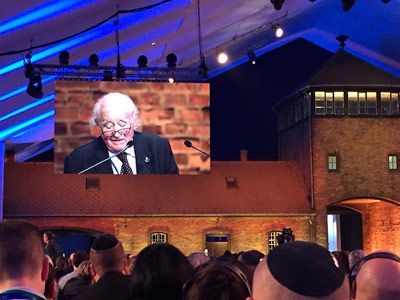
Filter by content type:
Filter by date:
Armin T. Wegner was in the German Sanitary Corps and was posted to Eastern Turkey during WWI. There he was witness to the genocide of the Armenian people. Seeing the devastating consequences of the deportations he documented the genocide in photographs, keeping meticulous notes at great personal risk.
Wegner was arrested for his covert documentation, but was able to smuggle his photographs back to Germany. These photographs were later used in German Court as evidence that genocide had indeed taken place in Eastern Anatolia against the Armenian people.
Auschwitz was one of five death camps established by the Nazis in Poland where Jews were taken to be murdered during the so-called “Final Solution,” a euphemism for the their genocide. We know it through the horrific photos of trains filled with Jews, of men being split from women, parents from children, of the uniformed Nazi wagging his finger, and of the brick chimneys billowing smoke. But there is a much more intimate story still to be heard.
Auschwitz, the final destination of Jewish people from across Europe destined to be murdered as a part of the Nazi genocide of the Jews.
Auschwitz, a place that housed prisoners of many religions, persuasions, minorities and nationalities, but whose evil reputation is seared onto our collective conscience because the five gas chambers at Birkenau were there for one reason only - to devour the lives of 960,000 Jews.
Auschwitz, which has evolved into a universal symbol of man's inhumanity to man – and indeed it does remind us just how cruel human beings can be.
USC Shoah Foundation Center for Advanced Genocide Research Director Wolf Gruner and Center Fellow Kiril Feferman will both present papers at the 47th Annual Conference of the Association for Jewish Studies in Boston, Mass.
Gruner will present "Letters and Memoranda: Overlooked Jewish Means of Opposition and Protest Against the Persecutin in Nazi Germany." Feferman will present "Responses of Ukrainian and Russian Jewish Religious Leadership to the Ukrainian Crisi"

It took months of preparation. But there is little one can do to prepare for a visit to Auschwitz.
I found as a teacher that the most challenging task when teaching about the Holocaust and genocide, is how to do it not using material that shocks the students to the point that they do not want to look at the content, study the history or listen to present day issues due to the emotional shut down that can occur.
Pagination
- Previous page
- Page 8
- Next page